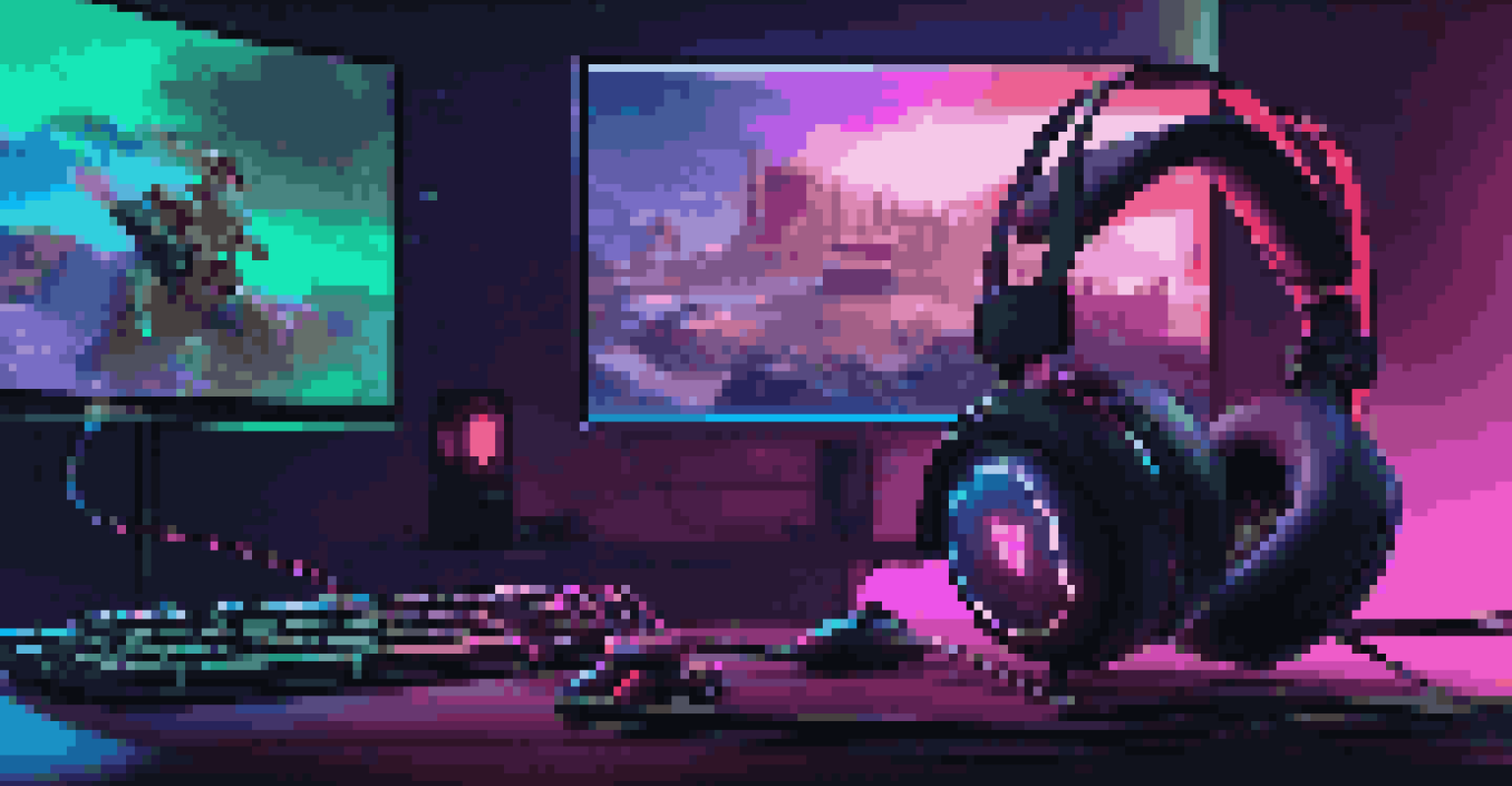Integrating Gaming Consoles into High-End Home Systems

Understanding the Basics of Home Theater Systems
Before diving into integration, it's crucial to understand what a high-end home theater system entails. These systems typically consist of a combination of high-definition displays, surround sound speakers, and various multimedia devices. Each component works in unison to create an immersive viewing experience, whether you're watching movies or playing games.
The greatest piece of technology is the one that enhances the experience of being human.
At the heart of these setups is often a receiver, which acts as the control center for all your devices. It processes audio and video signals, ensuring everything is synchronized perfectly. Understanding these components will help you see where your gaming console fits into the overall picture.
Finally, consider the importance of cable management and connectivity options. A well-organized system not only looks better but also performs better. With the right setup, you can enjoy both gaming and cinematic experiences without any hassle.
Choosing the Right Gaming Console for Your Setup
Not all gaming consoles are created equal, especially when it comes to high-end systems. Popular options like the PlayStation 5 and Xbox Series X offer stunning graphics and performance that can rival many premium entertainment systems. Choosing a console that complements your home theater’s capabilities is key to an optimal experience.

Consider the exclusive games and features that each console offers. For instance, if you're a fan of virtual reality, the PlayStation 5 has exclusive VR capabilities that might enhance your gaming experience. On the other hand, Xbox Game Pass offers a massive library of games that can be accessed at a low monthly cost, which might suit a different type of gamer.
Key Components of Home Theater Systems
Understanding the essential elements of a home theater system, including displays, receivers, and cable management, is crucial for creating an immersive experience.
Additionally, pay attention to the console’s resolution and frame rates, as these can significantly impact your gaming visuals. A high-end home system can take full advantage of 4K gaming, so ensure your console is up to the task.
Setting Up Your Console for Optimal Performance
Once you've chosen your console, it's time for setup. First, you’ll want to connect it to your receiver or soundbar using HDMI cables. Make sure to use high-speed HDMI cables that support 4K and HDR for the best possible visuals and sound. This step is crucial for ensuring that your gaming experience is as immersive as possible.
The best entertainment is the kind that pulls you in and makes you feel part of the story.
Next, adjust your display settings on the console to match your TV’s capabilities. For example, if your TV supports HDR, enabling it on your console will enhance color and contrast, bringing your games to life. Each little tweak can make a big difference in how your games look and feel.
Finally, don’t overlook the importance of internet connectivity, especially for online gaming and downloading updates. A wired connection is often more stable than Wi-Fi, so if possible, connect your console directly to your router for the best performance.
Integrating Your Console with Smart Home Features
In today’s tech-savvy world, integrating your gaming console with smart home features can elevate your experience. For example, using voice commands via smart assistants like Google Assistant or Amazon Alexa can help you control your console and other devices hands-free. Imagine starting a game or adjusting volume just by saying it out loud.
Additionally, consider using smart lighting systems that sync with your gaming. Brands like Philips Hue allow you to create immersive atmospheres that change colors based on what’s happening on screen, enhancing your gaming experience even further. This kind of integration can turn a simple gaming session into a fully immersive event.
Selecting the Right Gaming Console
Choosing a gaming console that complements your home theater capabilities, such as resolution and exclusive features, enhances overall gaming enjoyment.
Moreover, don’t forget about streaming services. Many consoles now support apps like Netflix and Disney+, allowing you to seamlessly switch from gaming to streaming without needing to change devices. This versatility can make your high-end home system even more enjoyable.
Choosing the Right Audio Setup for Gaming
Audio plays a pivotal role in gaming, so choosing the right sound system is essential. A high-end surround sound system can immerse you in the game, allowing you to hear every footstep and explosion with clarity. When integrating your console, ensure that your audio system is compatible with the console’s output.
Consider investing in a soundbar or a full surround sound setup that supports Dolby Atmos. This technology creates a 3D sound environment, making you feel like you're truly a part of the action. It’s like having a personal cinema experience right in your living room.
Lastly, don’t forget about gaming headsets. For those who prefer a more personal experience, a high-quality gaming headset can provide excellent sound quality and comfort. Plus, many headsets come with built-in microphones for easy communication during multiplayer gaming.
Managing Game Libraries and Subscriptions
As gaming evolves, so does how we access games. Subscription services like Xbox Game Pass and PlayStation Plus provide a vast library of games at your fingertips, making it easier than ever to try new titles without a hefty investment. These services can be a game-changer for avid gamers looking to expand their collections.
Organizing your digital library is also important. Make sure to categorize your games for easy access and consider deleting titles you no longer play to free up space. Most consoles allow you to manage your library efficiently, ensuring you can find your favorites without digging through a long list.
Optimizing Console Performance
Proper setup, including HDMI connections and display adjustments, along with smart home integration, can significantly improve your gaming experience.
Additionally, keep an eye on sales and discounts on digital storefronts. You can often find great deals on games that can enhance your library without breaking the bank, making your gaming experience even richer.
Troubleshooting Common Issues with Consoles
Even the best systems can face hiccups, so knowing how to troubleshoot common issues is essential. For instance, if your console isn't recognizing your TV, check your HDMI connections and ensure that your TV is set to the correct input. Often, simply reseating cables can resolve the problem.
Another frequent issue is slow performance or lag during gaming. This might be due to a lack of storage space or a slow internet connection. Regularly clearing out unused games and ensuring your internet connection is stable can help maintain optimal performance.

Lastly, don’t hesitate to consult online forums or support pages if problems persist. Many gamers share their solutions to common issues, and the gaming community can be a valuable resource in troubleshooting and keeping your system running smoothly.